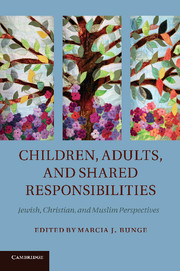Book contents
- Frontmatter
- Contents
- List of Contributors
- Acknowledgments
- Introduction
- PART I RELIGIOUS UNDERSTANDINGS OF CHILDREN
- PART II RESPONSIBILITIES OF CHILDREN AND ADULTS
- Chapter 9 Work, labor, and chores
- Chapter 10 Honor your father and your mother
- Chapter 11 Will I have Jewish grandchildren?
- Chapter 12 Linking past and present
- Chapter 13 Orphans and adoption
- Chapter 14 Second-hand children
- Chapter 15 Christianity's mixed contributions to children's rights
- Chapter 16 Children's rights in modern Islamic and international law
- Select bibliography
- Index of names
- Index of subjects
- References
Chapter 11 - Will I have Jewish grandchildren?
Cultural transmission and ethical and religious concerns among ethnoreligious minorities
from PART II - RESPONSIBILITIES OF CHILDREN AND ADULTS
Published online by Cambridge University Press: 05 October 2012
- Frontmatter
- Contents
- List of Contributors
- Acknowledgments
- Introduction
- PART I RELIGIOUS UNDERSTANDINGS OF CHILDREN
- PART II RESPONSIBILITIES OF CHILDREN AND ADULTS
- Chapter 9 Work, labor, and chores
- Chapter 10 Honor your father and your mother
- Chapter 11 Will I have Jewish grandchildren?
- Chapter 12 Linking past and present
- Chapter 13 Orphans and adoption
- Chapter 14 Second-hand children
- Chapter 15 Christianity's mixed contributions to children's rights
- Chapter 16 Children's rights in modern Islamic and international law
- Select bibliography
- Index of names
- Index of subjects
- References
Summary
Jewish societies provide a useful case study of the ways that religious communities transmit religious values and practices to children because Jews have survived as a minority culture under diverse and frequently disadvantageous conditions. Today, many religious communities – especially minorities – face unprecedented challenges in a “globalized” world. Small minorities must seek effective strategies for cultural transmission from generation to generation if they are to survive. When distinctiveness is eroded, small minorities sometimes disappear. This worry is often articulated by middle-aged Jews in the question: “Will I have Jewish grandchildren?”
Many contemporary Jews have mixed feelings about emphasizing religious identity. Although pride in ethnic particularism and the “salad-bowl” concept have largely replaced the “melting-pot” concept from the late 1960s onward, some Jews still fear being “too Jewish” – and thus jeopardizing hard-won Jewish integration. Other Jews fear particularism may dilute Judaism's strong ethical commitment to social justice for all people – a venerated religious concept often epitomized by the Hebrew (biblical) phrase, tikkun olam (repairing the world). The notion of tikkun olam emphasizes service and ethical behaviors in both personal and communal spheres. The liturgy of Yom Kippur makes this ethical emphasis clear: In the litany of “sins” that Jews are warned to avoid the vast majority are not ritual transgressions but ethical and moral transgressions – slander, unkindness, oppressing the poor, neglecting aging parents, or being seduced by ease and pleasure rather than following the difficult path of social morality.
- Type
- Chapter
- Information
- Children, Adults, and Shared ResponsibilitiesJewish, Christian and Muslim Perspectives, pp. 202 - 218Publisher: Cambridge University PressPrint publication year: 2012
References
- 4
- Cited by



